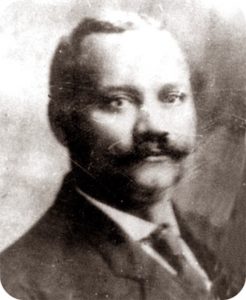
Scipio A. Jones
*The birth of Scipio Jones in 1863 is celebrated on this date. He was a Black attorney and activist at the end of the nineteenth century and during the first decades of the twentieth century.
Scipio Africanus Jones was born near Tulip, Arkansas. His father was Dr. Sanford Reamey, a white man and the owner of Jones’ mother, Jemima. Jones attended schools for blacks in the Tulip area and later moved to Little Rock, attending Walden Seminary. He then attended Bethel Institute (now Shorter College), receiving a bachelor’s degree in 1885. During the next four years, Jones taught public school while studying law independently. On June 15, 1889, Jones passed the bar. The Supreme Court of Arkansas accepted his credentials in 1900, and the U.S. Supreme Court in 1905.
Jones practiced law in Little Rock for the rest of his life. He frequently represented indigent citizens and worked to correct abuse and injustice in Arkansas’s penal system; Jones twice served in a temporary capacity as a judge. The most significant case in which Jones was involved was the defense of twelve Black men arrested during the Elaine Massacre. Between November 3 and 17, 1919, twelve men were tried, convicted, and sentenced to death for murder in their roles in a supposed Black uprising; the trials were marked by weak evidence, a lack of cross-examination of witnesses, and short deliberations by the local juries.
Black citizens of Little Rock hired Jones to work with the firm of George W. Murphy, an attorney hired by the National Association for the Advancement of Colored People (NAACP). By January 14, 1925, all twelve defendants had been released. In one legal brief, Jones described his case as “the greatest case against peonage and mob law ever fought in the land.” Jones is also recognized as responsible for preventing a repeat of the Elaine Massacre. He and other community leaders persuaded Black citizens to avoid confrontation amidst the mob violence surrounding the lynching of John Carter on May 4, 1927.
Jones was sometimes criticized for his non-confrontational approach to race relations. He counted many leading white citizens of Arkansas among his friends. However, when the leaders of the Republican Party in Arkansas sought to exclude Blacks from the workings of the party, he resisted. Jones himself ran for the Little Rock school board in 1902 but was defeated by a vote of 2,202 to 181 after the Arkansas Gazette published warnings about the danger of having a Black man seated on the school board. In 1920, Jones helped to organize a separate party convention for Black voters after the Pulaski County convention was moved without advance notice being given to blacks. Still, state and national party conventions refused to seat the black delegates.
In 1924, the Republican state committee did agree to hold party conventions in “places where all Republicans can attend” and expanded its commitment to include two positions reserved for blacks. On May 1, 1928, Jones was chosen as a delegate from Arkansas to the Republican National Convention. He also served in this position in 1940. In 1930, Jones was among a group of Black lawyers who sued (unsuccessfully) the Democratic Party in Arkansas to reverse rules that prevented Black citizens from voting in the Democratic state primary elections.
Jones is said to have owned roughly ten houses in Little Rock around 1907, including a “splendid” house where he and his family lived at 1808 Ringo Street. Jones was a major stockholder in the Arkansas Realty and Investment Company and was also elected president. The corporation failed and was dissolved on June 19, 1911. Jones also heavily invested in the People’s Ice and Fuel Company of Little Rock, which succeeded for a time but failed during the Depression. Jones was married twice. His first wife, Carrie Edwards Jones, was twenty-five when they were married on March 14, 1896. They had a daughter, Hazel, who died as a young adult. After the death of Carrie, Jones married Lillie M. Jackson in 1917. The couple had no children. Jones was a member of Bethel AME Church in Little Rock for over fifty years.
Jones died in his home in Little Rock on March 28, 1943. Among the honors given to Jones are two significant buildings named for him. The junior and senior high school in North Little Rock was named for him from its construction in 1928 until its closing (due to the end of segregated education) in 1970. The U.S. post office at 1700 Main Street in Little Rock was named for Jones in 2007.
“Scipio Africanus Jones.”
Arkansas Black Lawyers.
(accessed January 7, 2008).
